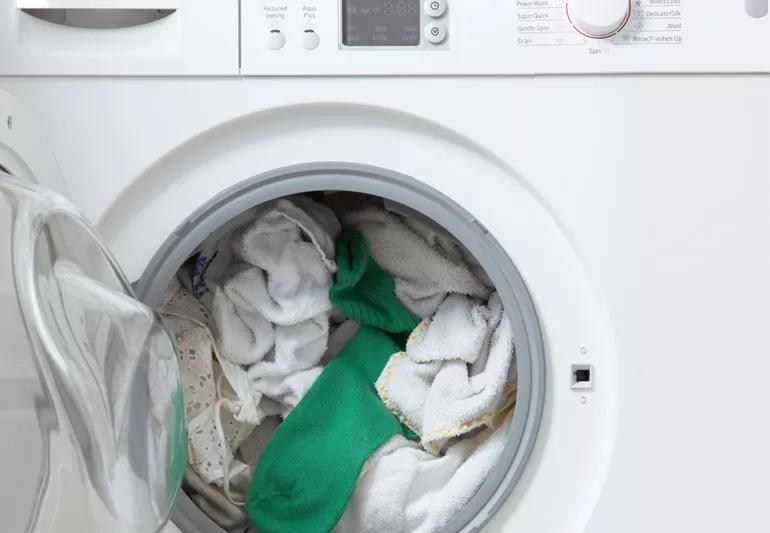How to help (and not shame) your child — while keeping your sanity

Image content: This image is available to view online.
View image online (https://assets.clevelandclinic.org/transform/79545ebf-677a-42d7-810a-a9f7d27e2b71/encopresisLaundry-82567374-770x533-1_jpg)
Lots of laundry when encopresis is present
Potty training, in all honesty, probably ranks up there with one of your least pleasurable parts of parenting. And you’re SO thankful when — at long last — it’s over!
Advertisement
Cleveland Clinic is a non-profit academic medical center. Advertising on our site helps support our mission. We do not endorse non-Cleveland Clinic products or services. Policy
Or wait, a pooping accident? What happens when your perfectly potty-trained (and possibly even school-aged) child starts having not just one random, unexplainable accident? They’re either pooping or leaving rather significant skid marks in their underpants, regularly. Or, even hiding their soiled underwear. Ugh.
It’s equal parts gross and frustrating, and you’re really tired of all that laundry (or buying new packs of undies because you don’t want to deal with it). What in the world is going on?
The answer might be encopresis, a condition that causes soiling as a result of chronic constipation. It’s a difficult condition, admits pediatric gastroenterologist Mohammad Nasser Kabbany, MD. “Soiling is stressful for the child and the parents.”
But help is available. Here’s what you should know about encopresis — and how to get things moving, so that you can move on, too.
Encopresis happens in kids who have already been potty trained. It can be maddening for parents, who often don’t understand why their child just can’t make it to the toilet. But the behavior isn’t something that a child can control, Dr. Kabbany explains.
The problem starts with constipation. When children can’t go easily or comfortably, they tend to hold it. “But the longer the stool stays in the colon, the harder it becomes. You end up with more stool accumulating,” Dr. Kabbany says.
Advertisement
Over time, the plug of poop that accumulates can actually stretch out the colon, dulling the nerves that normally signal when it’s time to go. “The colon gives up and stops sending signals,” Dr. Kabbany says.
Soiling occurs when softer stool seeps out around that backup. Parents may think their child has diarrhea, when in reality, it’s the opposite problem.
Treating encopresis means treating chronic constipation. The first step, Dr. Kabbany says, is to remove the accumulated stool so things can move freely. “You have to break the cycle by removing the plug.” That usually requires a treatment such as an enema or laxative. (Pro tip: Let your doctor handle that part.)
The second step is to prevent more backups from forming. That typically involves three key changes:
“Treatment takes some effort,” Dr. Kabbany says. Even after things get moving again, it can take months for the colon to return to normal— and to restart sending those “time to poop” signals.
During that time, there’s a risk of symptoms recurring. But parents can help by promoting good bathroom habits, continuing diet changes and, yes, checking the toilet to make sure the poop is soft and regular.
Encopresis is a difficult condition, and it’s normal to feel overwhelmed and frustrated. It’s often a good idea to see a specialist, such as a pediatric gastroenterologist, who can help your kiddo get back on track.
And remember that it’s not something your child can control. “No child should be punished or penalized for soiling. Shaming is counterproductive,” Dr. Kabbany says. “Encourage your child, and praise any improvement, no matter how small.”
Children with encopresis may benefit from seeing a psychologist, he says. Mental health professionals can help kids cope with the shame and also help them develop healthy habits. Some clinics also have support groups for encopresis, Dr. Kabbany adds. “It can be helpful to meet with other families who have shared these experiences.”
Though it takes time and patience, treatment does help. Most children eventually become regular, without needing to take laxatives long-term. “The majority of these kids do get better,” he says.
Advertisement

Delivered every Tuesday!
Sign up for our Health Essentials emails for expert guidance on nutrition, fitness, sleep, skin care and more
Learn more about our editorial process.
Advertisement
Exercises and medical treatments can help you regain control of your bladder
A prostate massage is used most often for sexual stimulation
Get to the source, offer encouragement and keep your cool
Try elevating your legs during the day and stop drinking two hours before bed
Praise and nonfood prizes go a long way
When your toddler won’t poop, here’s what you can do
Reduce frustration and get more sleep
And everything else you need to know to successfully potty train
Type 2 diabetes isn’t inevitable with these dietary changes
Applying a hot or cold compress can help with pain
Pump up your iron intake with foods like tuna, tofu and turkey